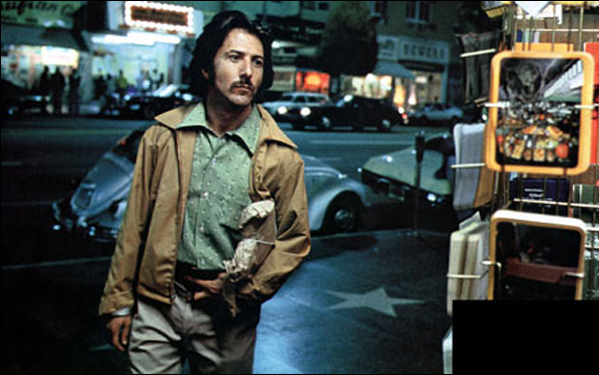Originally published on Premiere.com on June 24th, 2007.
“Come here you!” Theresa Russell shouted to Dustin Hoffman, after she had breathlessly bounded down the stairs of the Billy Wilder Theatre Saturday night. She was running late to the Q & A that followed a retrospective screening of 1978 criminal character study “Straight Time” at the L.A. Film Festival. Following a hug between the two, Russell exclaimed, “Oh my God, that was a long time ago.”
In fact, it was the first time since shooting the film, in which Hoffman plays an ex-con trying to walk the straight and narrow, wrapped that many of the cast and crew of the film had seen each other – so much so that the film’s technical advisor John Carlin, a former thief who helped plan “Straight Time”’s armed robberies, had gone to jail and been released, only to turn into a screenwriter after “Straight Time” finished shooting.
Moderated by L.A. Weekly critic Scott Foundas, the panel included what seemed like a full reunion with Hoffman, Russell, cinematographer Owen Roizman, producer Tim Zinneman, Harry Dean Stanton and director Ulu Grosbard, whom Hoffman hired to direct his pet project after Hoffman “fired” himself following a disasterous pre-production at Folsom prison. The production was Hoffman’s first and last for First Artists, the collective production company that was formed by Hoffman, Paul Newman, Sidney Poitier, Steve McQueen, and Barbara Streisand during the 1970s with the intention of giving its stars the ability to greenlight their personal projects for under $3 million. As Grosbard recounted, “Straight Time” cost $4 million, prompting a chagrined Hoffman to say, “I forgot that.”
What Hoffman didn’t forget was “Straight Time”’s monster 179-page script, which was originally penned by Alvin Sargent, who by the time of production was too busy working on “Ordinary People”, the film that would win him a second Oscar. According to Grosbard, Michael Mann had taken a stab at it before future “Indiana Jones” scribe Jeffrey Boam whipped the script into a lean 124 pages and as Grosbard told the crowd, “It cost as much not to shoot as to shoot, so let’s shoot.”
Hoffman had no problems sliding into the shoes of Max Dembo, the low level hood loosely based on the life of “Straight Time”’s late author Edward Bunker. The actor said he was fascinated by the connection convicts have to artists — “They puncture society in a similar way” — and knew exactly how to get into character after Bunker told him how he could rationalize the murder of a child who got in the way of a robbery by saying, “that mother shouldn’t walk in front of the bank with her baby.” Hoffman also added that criminals had another thing in common with actors — they liked watching themselves on the five o’clock news. “It’s like an actor getting good reviews,” said Hoffman.
Hoffman also took the opportunity to give a good review to Russell, who played Dembo’s naïve girlfriend in the film. Grosbard said that Sally Field and Sissy Spacek were among those who tried out for the role, but the director found them to be “girls you couldn’t figure out why they were hanging out with this guy” and Hoffman added that “Ulu instinctly caught need” in Russell, who said “I had a past, even at 19.”
The cast and crew also shared the details of an original opening sequence for the film that involved Hoffman getting a rubdown from a fellow prisoner while he’s still in the pen and how co-star Harry Dean Stanton sat in a gas chamber for research, though the finished film doesn’t have such a scene.




